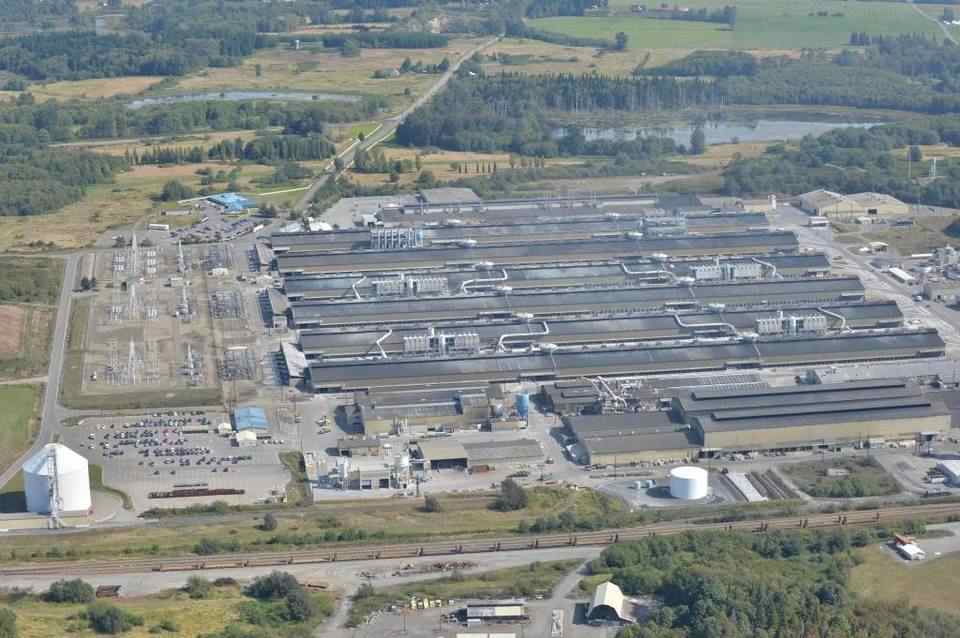BPA doesn't have enough dependable low-cost hydropower
to promise the Intalco plant.
 From the Washington Post -- Workers want a 'green' aluminum plant. Now they just need clean power.
From the Washington Post -- Workers want a 'green' aluminum plant. Now they just need clean power.
A plan to revamp the Intalco Works aluminum smelter as a key piece in the future of renewable energy in the United States has been embraced by seemingly everyone: the machinists union, a private equity firm, the new electric vehicle industry, environmental groups and the state's political establishment -- from Washington's pro-environment governor, Jay Inslee (D), to pro-jobs local Republicans.
And it would make the smelter the only one functioning west of the Mississippi.
But a final obstacle -- how to power the factory, and who will pay for that -- may yet scuttle the deal. The dominant Bonneville Power Administration, a federal agency which manages the Pacific Northwest's huge dams and sprawling transmission lines, is balking, saying it simply doesn't have enough dependable low-cost hydropower to promise the Intalco plant.
The deadlock over electricity is yet one more indication of how difficult it is to expand the U.S. supply chain and bring American industries back home.
- May 1966: The Ferndale-area smelter begins operation as Intalco Aluminum Corp., owned by Alumax, Pechiney and Howmet.
- 1970: Intalco has 1,350 employees.
- October 1983: Union workers approve three-year contract, ending a two-week strike.
- 1983: Intalco produces 8 percent of the nation's aluminum.
- 1984: Record set with 286,000 tons of aluminum shipped.
- June 1998: Alcoa Inc. and Alumax merge, creating Alcoa Intalco Works.
- May 2000: Alcoa executives consider building their own power plant to run Intalco, out of concern over rising energy rates.
- May 2001: Unable to cope with high energy prices, Intalco temporarily closes the plant, keeps its employees, and sells its power back to Bonneville Power Administration to aid in the energy crisis. BPA pays for the wages and benefits of nearly all the workers, plus $1.75 million to cover Intalco's tax burden.
- May 2002: After being shut down for six months, the smelter reopens two potlines.
- October 2003: Alcoa shuts down a potline because of high energy costs, cutting 200 jobs and leaving only one of three potlines in use.
- June 2006: Alcoa becomes full owner, buying out remaining partners.
- August 2006: Alcoa signs five-year power contract with BPA, ensuring work for its 450 employees.
- February 2007: The smelter restarts its second potline, boosting employment to 575.
- October 2008: BPA proposes long-term contract to power Intalco.
- October/November 2008: In response to the recession and less demand for aluminum, the smelter institutes budget cuts, including cutting about 100 jobs.
- July 2009: BPA and Intalco reach tentative agreement for enough low-cost power to run the plant at or near two-thirds capacity for seven years, guaranteeing at least 528 jobs.
- September 2009: After an August court ruling restricting BPA's authority to share power with Intalco, the July proposal appears to be in jeopardy.
- December 2009: BPA approves a two-phase contract that guarantees enough power to keep 528 workers employed for 17 months. After that, BPA could offer five more years of power if courts approve and economic conditions permit.
- October 2010: BPA agrees to short extension of its contract with Intalco, guaranteeing the smelter's power supply through late May 2012.
- January 2011: Alcoa announces the hiring of 60 more employees and an increase in production.
- October 2011: Union workers vote to strike, but stay on the job while talks continue. After two weeks, workers accept a revised contract offer.
- December 2012: The plant signs a 10-year power contract with BPA.
- 2013: The plant is at 80 percent capacity, with two-and-a-half of three potlines operating, producing about 230,000 metric tons of aluminum a year.
- September 2015: Alcoa announces it is splitting into two companies. Intalco Works focuses on upstream products, including aluminum, considered the weaker of the two companies.
- October 2015: Union workers approve contract extension through March 2017.
- November 2015: Alcoa announces it is idling smelter operations at its Ferndale and Wenatchee plants. The Ferndale shutdown affects more than 400 workers.
- May 2016: Alcoa and BPA finalize a contract amendment that keeps Intalco operating. The amendment lasts through Feb. 14, 2018; the 10-year contract itself runs until September 2022.
- Aug. 13, 2016: Alcoa Intalco Works celebrates 50 years in operation at its annual employee summer picnic.
- Sept. 30, 2016: Alcoa splits into two companies, Alcoa and Arconic. Intalco remains with the Alcoa brand.
- Aug. 5, 2019: Alcoa to put in new pollution equipment to reduce sulfur dioxide emissions. The $15 million project was scheduled to be completed in 2022.
- March 25, 2020: An Intalco worker tests positive for COVID-19.
- April 22, 2020: Alcoa announces it is closing the Intalco smelter in July, laying off around 700 workers.
Sources: Bellingham Herald files, Alcoa Intalco Works
Staff has covered the Whatcom County business community since 1998. Retail, real estate, jobs and port redevelopment are among the topics he covers.
BPA is Balking, Lobbyists Gonna Lobby
The Stand, June 8, 2022
See what you can learn
learn more on topics covered in the film
see the video
read the script
learn the songs
discussion forum



 From the Washington Post -- Workers want a 'green' aluminum plant. Now they just need clean power.
From the Washington Post -- Workers want a 'green' aluminum plant. Now they just need clean power.
